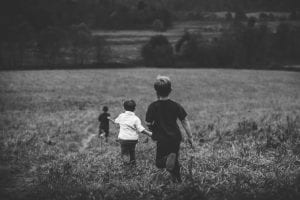
‘Free range’ tends to be a term people associate with chickens, rather than parents. Yet free range parenting is a growing movement across the US, gaining momentum and media attention with each passing day. But what is it? And can it thrive in our current “parental lock-down” climate?
Free range parenting harkens back to the day when letting your children walk to school alone, ride their bikes around the neighborhood unsupervised, or play at a neighborhood park wasn’t considered neglectful or irresponsible. That, of course, has changed. So is it possible to be a free range parent in our society today? More and more parents are saying “yes”, but at what cost?
Recent case history is full of examples of parents intentionally choosing to allow their children certain freedoms. Freedoms that would have been commonplace as little as thirty years ago. However, they are paying for their choices in terms of bitter, drawn-out legal battles. Parents who were convicted of neglect for allowing their children to play at a local park. Or parents who let their children play across the street, and were put on the child abuse registry as a result.
Lenore Skenazy, the author of Free Range Kids: How to Raise Safe, Self-Reliant Children (Without Going Nuts With Worry), says that free range parenting is based on the idea that parents can give their children the same freedoms they themselves enjoyed as children. And while it makes sense to many parents who want their children to develop autonomy and independence, the government doesn’t appear to agree.
Our current culture puts a great deal of emphasis on children being supervised at all times.
This perspective is reinforced by the fact that the state is quick to accuse parents of negligence and abuse for allowing their children responsibility, and the courts seem quick to convict. But are we harming our children, more than we’re protecting them?
Richard Gallagher, PhD, an associate professor of child and adolescent psychiatry at NYU’s Child Study Center, says yes. With freedom comes responsibility. And if the focus of free range parenting is providing children with the kind of freedom that promotes self-awareness and greater emotional development, than the direct result should be greater responsibility.
According to Gallagher, parents who provide their children with more responsibility allow those children to mature more quickly, and develop a greater sense of personal accomplishment. But not everyone agrees with this assessment.
Many parents are afraid. Not just of what might happen – the possibility of kidnappings, abuse, and unforeseen accidents – but of the legal ramifications. That terrifying knock on the door by a CPS agent who wants to ask you a few questions about your parenting choices.. Free range parenting appears to fall in direct contrast to what the state says is the acceptable way to parent our children nowadays.
What do you think? Would you allow your children to play unsupervised at a park, as the Meitiv family did, before police intervened and the parents end up in court, guilty of child neglect. Would you allow your child to ride the subway alone as Skenazy did? Do you consider yourself more of a “helicopter” parent, or a free range parent?
Whatever your choice, the fact remains that it should be yours to choose. How you decide to safely parent your children is no one else’s business, and assuming that children are at risk the moment they aren’t supervised is clearly ridiculous. So if you or a loved one have been accused of neglectful parenting when in fact you are a believer in free range parenting, call the experienced CPS defense attorneys at The Kronzek Firm at 866 766 5245. We are here to help.

